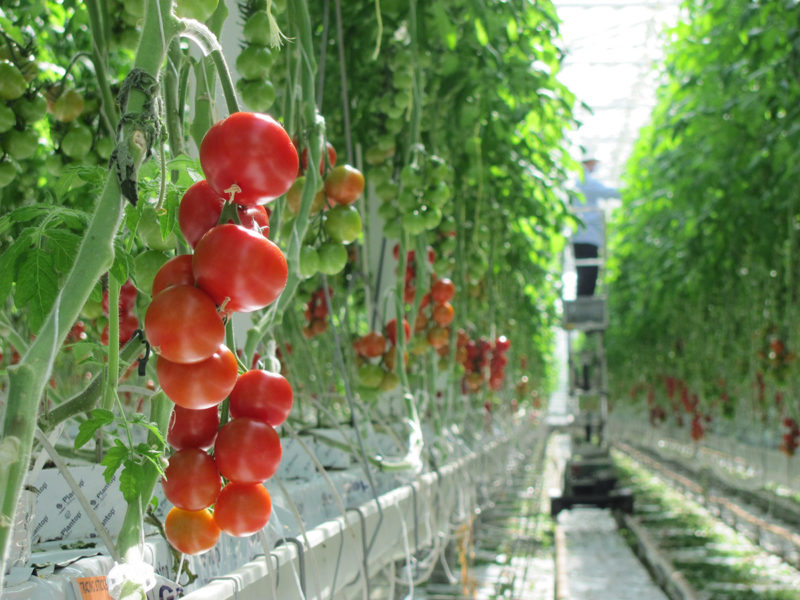SURREY – BC greenhouse vegetable growers have begun consultations with members on a new marketing commission for the sector.
Currently regulated by the BC Vegetable Marketing Commission, the greenhouse sector has unique needs that BC Greenhouse Growers Association (BCGGA) president Armand Vander Meulen says don’t fit well with potatoes and other storage crops regulated by BC Veg.
“There is just a fundamental flaw because there’s no commonality between our interests, at all,” he says. “The only solution that our six-member grower association board feels is the solution to that fundamental flaw is the separation of the two distinct commodity groups.”
Greenhouse vegetables are worth nearly four times the value of storage crops regulated by BC Veg, at $396 million versus $104.1 million. BC Veg’s definition of greenhouses includes vertical farms.
Storage crops such as potatoes have a long storage life versus greenhouse produce, a perishable item that faces significant pressure from imports. Potatoes are protected from imports by anti-dumping measures.
Study shows opportunities
A study accounting firm MNP LLP prepared for BCGGA and presented at the association’s annual general meeting on June 25 identifies several strengths and opportunities growers could enjoy through a commission of their own.
Strengths include giving greenhouse growers a measure of self-governance that prioritizes their interests, including labour, international trade and energy.
Opportunities include “an enhanced governance structure, transparent decision-making and sector-specific expertise” as well as the development of marketing programs tailored to the sector’s domestic and international markets.
The study also sees the potential to alleviate cash flow issues the BCGGA experiences while waiting for levies collected on its behalf by BC Veg.
The study was based on interviews with five of the BCGGA’s six directors, not the full membership. MNP’s analysis also looked to the Ontario Greenhouse Vegetable Growers as a model for a possible BC commission.
BCGGA first raised the idea of a separate marketing commission last year.
A survey of the sector’s 60-plus growers regarding the idea was launched in late July. The feedback will lay the groundwork for a business case and governance model for the proposed commission.
Growers who attended the June 25 meeting raised few questions, with most voicing support for the idea.
Veteran grower Casey Houweling of Houweling Nurseries in Ladner stated emphatically, “It’s the right thing to do.”
John Newell of Windset Farms was among those questioning the move towards a new marketing commission, arguing that the vegetable industry is one.
“It doesn’t matter how you grow it,” he said. “We’re all selling the same thing.”
Several growers called him out on the claim, with Vander Meulen arguing that greenhouse vegetables require unique oversight because of their exposure to foreign competition.
BC Veg chair Derek Sturko attended the townhall, as well as general manager Andre Solymosi and other representatives.
Sturko pointed out that the Ontario model was not directly transferrable to BC.
Under the province’s Natural Products Marketing Act, marketing boards and commissions are limited to oversight rather than advocacy and marketing, one of the opportunities MNP identifies for the proposed greenhouse commission.
“The current legislative model in BC does not allow the Ontario model to exist as it exists in Ontario,” Sturko said.
Vander Meulen downplayed the concerns, saying the enabling legislation could be changed.
“Acts are there, and they’re there as guidance, but they’re also there to be changed as necessary,” he said. “But quite frankly, I don’t know what area we could be in conflict with that act.”
Vander Meulen says that greenhouse growers, unlike the supply-managed groups, do not set price.
“We do not set price, we do not control production, we do not control imports or exports,” he said. “What we are talking about is quite a different thing.”
A handout from the commission outlining its concerns was available to attendees.
“It seems counter-intuitive for the BCGGA to be destabilizing the industry through its efforts, as opposed to simply bringing issues forward to [BC Veg] and working cooperatively within the existing system,” the handout stated.
This didn’t sit well with growers, including BCGGA director Vijay Randhawa of Randhawa Farms in Abbotsford.
“Why is it unfortunate? If we’re here to do what’s best for the industry and we’re looking and we’re writing a report, doing some research, why is that unfortunate?” he asked. “That kind of rubs me the wrong way.”
Part of larger shakeup
BCGGA’s proposal is part of a larger shakeup of regulated marketing taking place in BC.
The province’s apple growers are exploring the possibility of establishing a marketing commission in the hope it will stabilize their sector, while dairy producers are working to harmonize the activities of the marketing boards across the four Western provinces.
However, challenges to dairy’s efforts by the BC Farm Industry Review Board highlight the limits first-instance regulators face in BC.
BC FIRB has repeatedly told the BC Milk Marketing Board it cannot involve itself in matters that are the concern of producers under BC law, such as market development and advocacy.
BC Ministry of Agriculture and Food greenhouse specialist Rajiv Dasanjh said the province would look to the BC Vegetable Scheme regulation “for any amendments or additions” if greenhouse growers proceed to establish their own commission.
“It would be good to engage with our policy team to ask some of those questions in terms of the legislative feasibility of doing this thing so you’re well-informed of the path you’re going down,” Dasanjh told the meeting.
Any proposal for a new regulatory body for greenhouse growers must go to a vote of growers as well as receive the blessing of BC FIRB, which oversees orderly marketing in BC under the province’s Natural Products Marketing Act.


 Farming Karma scales up on-farm processing
Farming Karma scales up on-farm processing